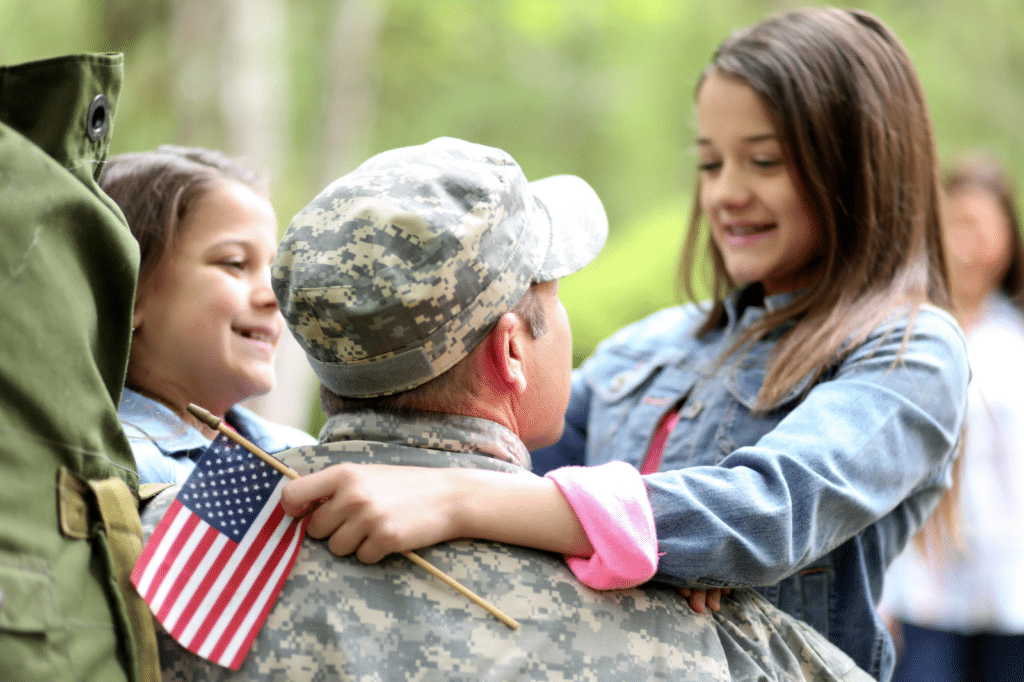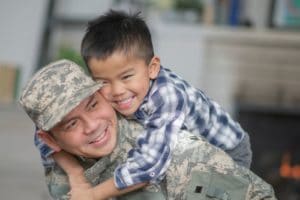Just like other institutions, the military community has its own set of values, norms and language that are unique and specific to this population. Children of military families live in unique places, have unique experiences, and are exposed to much more than children raised outside of the military community. There is a significantly different way of day-to-day living, even as the military tries to offer normalcy to their troops and families.
need for structure
Studies have shown that children benefit from structured environments; military children are no different. Children of military families are exposed to and experience multiple stressors stemming largely from a structureless environment. Active stressors in military families primarily include deployments that lead to an absentee parent; Permanent Change of Station (PCS) moves; transitional support systems; culture shock; and growing up away from extended family..Parental deployment is the most significant stressor with roughly one in every four children developing symptoms of depression; parents reported academic performance suffered negatively in one out of five children, and the amount of anger outbursts increased in all age groups examined, as noted by the National Center for Children in Poverty (Sogomonyan & Cooper, 2012).
stages of deployment
Contrary to popular misconception, children are capable of experiencing—and are affected heavily by—stress. If we focus on the stress caused by deployment alone, the child experiences different kinds and levels of stress throughout the deployment status. Pre-deployment stress lasts for however long the parent is preparing for their deployment. The months, weeks and days leading up to the deployment cause feelings of distress, confusion and anxiety in children. During deployment, the child can experience feelings of abandonment, which explain the presence of symptoms of depression if the child was not previously diagnosed. This period of time also comes with excitement as they anticipate their parent’s return. Post-deployment stress comes sometime after the parent has returned. In the immediate time of their return, the family goes through a honeymoon phase. However, once the excitement of the family being back together fades, s the stress of a readjustment period comes with the passing of time; things have naturally changed. The stress is heightened if the parent was deployed during times of war since the likelihood of Post-Traumatic Stress Disorder (PTSD) is higher.
in school
Outside of changes in their homes, military kids of active-duty members attend roughly nine schools before they graduate from high school due to frequent relocations with PCS moves. The constant change in learning environments, teachers and friends can be another significant stressor for these children. Some noticeable psychosomatic characteristics can be present; parents need to be aware that their child may be experiencing some mental health distress such as developmental regression, anger outbursts, academic challenges, disinterest in things they typically enjoyed, insomnia or hypersomnia, and risk-taking behavior in teenaged children.
resilience
While these challenges could be considered risk factors in a clinical sense, it can also be a measure of a child’s resiliency. An ever-changing social and educational space can offer its own set of coping and interpersonal skills. Children from all age groups begin understanding how they form part of a microsystem and with that self-awareness comes a sense of belonging to this unique system.
worldview broadens
Children who have spent a large portion of their lives living overseas in duty stations across the world often benefit from it; as their worldview is broadened, they have the opportunity to learn other languages and grow to be more empathetic adults. With moves abroad, military children become more comfortable with the exposure to differences in many sociocultural aspects like language barriers, religious beliefs, social values, holiday celebrations, distributions of wealth and work-life structures. The increase in empathy largely stems from the family essentially being an immigrant in a new country and having to adjust to living in that country, which may be far from their own.
supporting military kids
Adjusting to military lifestyles is challenging for most adults, even those who have had exposure to the tools needed to succeed in the transition. Minimizing the impact of challenges on children is the first step safeguarding our littles and their mental health. We can help our military kids by building a support system that fosters communication; nurtures age-appropriate coping skills readily seeks mental health care, and incorporates hobbies and extracurricular activities.
As parents, caregivers and community members, we can continue building core elements of resilience. Fortify a child’s confidence by noticing efforts and successes and offering help to navigate challenges. Encourage coping strategies like expressing their feelings in healthy ways. Practice effective problem-solving skills like the breakdown method. Promote movement and active play, proper nutrition and sleep hygiene.
With the right support systems in place, children from military families can build on the experiences and challenges they face over the years and become resilient, skilled and empathetic adults in society.
Army resilience directorate. (n.d.). Retrieved April 4, 2023, from https://www.armyresilience.army.mil/ard/seven-cs.html
Collins, E. (2015). Experts explain mental state of military children. Www.Army.Mil. https://www.army.mil/article/147786/experts_explain_mental_state_of_military_children
Hester, J. (n.d.). The effects of military life on child development and mental health. Retrieved April 3, 2023, from https://www.asymca.org/blog/effects-of-military-life-on-child-development
Sogomonyan, F., & Cooper, J. (2012). Trauma faced by children of military families: What every policymaker should know – nccp. https://www.nccp.org/publication/trauma-faced-by-children-of-military-families/
Support, W. to, Wishbook, Careers, USO, F. a, Volunteer, Story, S. your U., Us, A., Inclusion, D. and, Facebook, Twitter, Youtube, Instagram, Linkedin, Telephone:+1 (888) 484 3876, Address:PO Box 96860 Washington, D. 20077-7677, Disclosures, C. Faq. T. of U. P. S., Contact, FAQs, Use, T. of, … ©2023 USO, I. A. R. R. (n.d.). Resilience, mental health and education as military children head to school in the midst of covid-19. United Service Organizations. Retrieved April 4, 2023, from https://www.uso.org/stories/2859-resilience-mental-health-and-education-as-military-children-head-to-school-in-the-midst-of-covid-19










